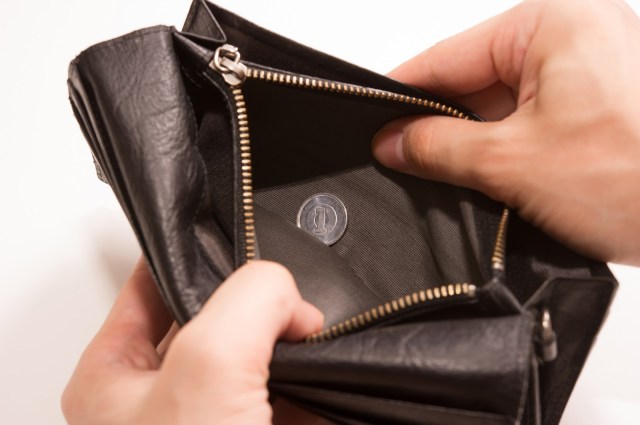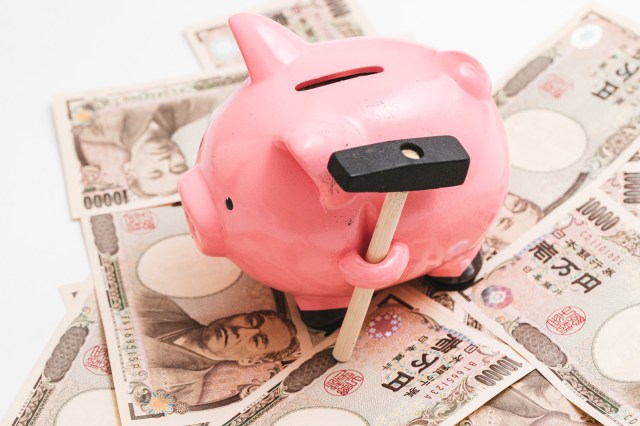
Young women in Japan are experiencing serious financial trouble.
Life in Japan can be tough in many ways–long hours at the office and overcrowded trains being two of the biggest difficulties–but with the country being so clean and the crime rates so low, you would think that poverty isn’t really an issue in the country. Unfortunately, it is — it’s just a hidden problem.
The cost of living is high in Japan, especially in Tokyo, because amenities that might be considered basic in other countries, like fruit, education, and even the process of moving into a new apartment are expensive. In fact, according to a recent survey done by financial news site Money Book, single women in their twenties are especially struggling to stay afloat, with more than 50 percent of respondents claiming that money is tight.
The survey is part of an endeavor to see how well the government’s efforts to reform the work environment and help promote women in the workforce are working. 350 twenty-something women from across Japan were surveyed about their work, salary, and expenses, and the results were pretty interesting. To start with, when asked about their salaries, 49.9 percent of respondents were earning less than 200,000 yen per month (US$2,094.38).
For reference, the rent of a decent one-room studio apartment in Tokyo usually starts at about 70,000 yen per month, but can go up to 100,000 or more, depending on location, size, and quality. At that rate, a salary of 200,000 yen could be pretty tight. You could make it on far less, but you would have to sacrifice a lot of the things that you enjoy. In fact, the average monthly expenses for these women came out to 143,685 yen, with the largest number of women (28.6 percent) reporting that they spend between 100,000 and 150,000 yen every month on bills and necessities.
(“Monthly expenses” included rent, utilities, phone bills, transportation, pension and health insurance payments, debt repayments, and food, as well as hobby expenses, beauty care, and other miscellaneous expenses, but not, seemingly, things like entertainment and eating out.)
Budgeting experts generally recommend that you designate 50 percent of your salary to rent, bills and necessities, then 20 to savings and 30 to “wants” like shopping or hobbies or other things you do for fun. But Japanese women appear to be putting more than that recommended number to bills, which might be a reason why they feel like money is tight.
Furthermore, 21.2 respondents reported that their expenses exceeded their income, meaning that their net income was less than zero. This likely means that they’re using credit cards to make ends meet, which is a dangerous habit. Coupled with the 14.6 percent who said their net income is between zero and 10,000 yen, that means a good third of this sample population is not able to put aside any money for savings.
The women work in different industries, but a large proportion, 33.5 percent, work in offices, including government work, sales, office administration, planning, reception, and data entry. 13.3 percent work in the service industry (sales clerks, cash register operators, etc), and 9.5 percent work from home. But of those working women, 36.6 percent said that they have more than one job, which seems to imply that, even working two jobs, many women are struggling to make ends meet.
However, according to Akirako Yamamoto of FP Woman, a financial planning company, this could be less sinister than it seems. There is a large pay gap between women in their early twenties and late twenties, she says. As younger women graduate from college and become fully fledged members of society, taking on full-time work, they begin to earn more than their younger counterparts, who are generally working part-time jobs to earn pocket change while in college. Yet still, those women who are working multiple jobs are doing it to supplement their low incomes, which is a significant point to keep in mind.
While these statistics all paint a general picture of these women’s lives, one question really honed in on each of the women’s personal experiences: “How do you feel about your monthly income and expenditures?” While about 43.4 percent of respondents feel okay with their financial situation, with 11.4 percent saying, “I’ve got plenty of wiggle room” and 32 percent saying “I’m doing fine”, the majority don’t feel comfortable with their finances.
47.1 percent said “Money is a little tight” and 9.4 percent said “Money is very tight”. Some participants also added responses like, “I can’t seem to get a permanent full-time job, so I’m worried about my employment/income”, and “No matter how much I work I can’t earn enough to offset my expenses”. Others talked about how this has affected their lives: “I’ve stopped carrying my bank card and credit cards around and am trying not to spend money”, and “I gave up my hobbies and lost friends because I stopped going out with them.” Through the answers provided in this survey, it’s clear that some women in their twenties are struggling to manage their rising expenses.
While this is a small sample study, it still paints a pretty dismal picture for women, who seem to regularly face discrimination in the hiring process and in the workplace itself. We can only hope that the results of this study will lead to policies that will help make life easier for women in Japan, because finding solutions for female poverty could also result in fixing a myriad of other problems in Japan, including the declining birth rate.
In the meantime, however, we may have stumbled upon one reason why young women tend to prefer marrying rich men and becoming housewives over staying in the workforce: working doesn’t appear to yield nearly as much reward as marrying rich.
Source: Canvas via Nico Nico News via My Game News Flash
Top image: Pakutaso
Insert images: Pakutaso (1, 2, 3, 4, 5)
● Want to hear about SoraNews24’s latest articles as soon as they’re published? Follow us on Facebook and Twitter!






 Survey shows how Japanese couples feel about spending so much time together sheltering in place
Survey shows how Japanese couples feel about spending so much time together sheltering in place What’s the minimum amount of money Japanese women want their husbands to earn? Survey investigates
What’s the minimum amount of money Japanese women want their husbands to earn? Survey investigates Survey says more than 70 percent of Japanese people think gender inequality exists in Japan
Survey says more than 70 percent of Japanese people think gender inequality exists in Japan Does a guy lose all chance with a Japanese woman if he doesn’t pay for the first date?【Survey】
Does a guy lose all chance with a Japanese woman if he doesn’t pay for the first date?【Survey】 Is it OK to split the bill on a date in Japan? Survey asks what women and men of different ages think
Is it OK to split the bill on a date in Japan? Survey asks what women and men of different ages think Foreigner’s request for help in Tokyo makes us sad for the state of society
Foreigner’s request for help in Tokyo makes us sad for the state of society McDonald’s new Happy Meals offer up cute and practical Sanrio lifestyle goods
McDonald’s new Happy Meals offer up cute and practical Sanrio lifestyle goods Red light district sushi restaurant in Tokyo shows us just how wrong we were about it
Red light district sushi restaurant in Tokyo shows us just how wrong we were about it Historical figures get manga makeovers from artists of Spy x Family, My Hero Academia and more
Historical figures get manga makeovers from artists of Spy x Family, My Hero Academia and more Anime girl English teacher Ellen-sensei becomes VTuber/VVTUber and NFT
Anime girl English teacher Ellen-sensei becomes VTuber/VVTUber and NFT Japan’s massive matcha parfait weighs 6 kilos, contains hidden surprises for anyone who eats it
Japan’s massive matcha parfait weighs 6 kilos, contains hidden surprises for anyone who eats it Pokémon Sleep camping suite and guestrooms coming to Tokyo Hyatt along with giant Snorlax burgers
Pokémon Sleep camping suite and guestrooms coming to Tokyo Hyatt along with giant Snorlax burgers Limited-edition Carbonara Udon will anger noodle purists and pasta lovers 【Taste test】
Limited-edition Carbonara Udon will anger noodle purists and pasta lovers 【Taste test】 Godiva Dessert joins the cute crepe game in Harajuku
Godiva Dessert joins the cute crepe game in Harajuku 11 different ways to say “father” in Japanese
11 different ways to say “father” in Japanese Japanese ramen restaurants under pressure from new yen banknotes
Japanese ramen restaurants under pressure from new yen banknotes All-you-can-drink Starbucks and amazing views part of Tokyo’s new 170 meter-high sky lounge
All-you-can-drink Starbucks and amazing views part of Tokyo’s new 170 meter-high sky lounge French Fries Bread in Tokyo’s Shibuya becomes a hit on social media
French Fries Bread in Tokyo’s Shibuya becomes a hit on social media Studio Ghibli releases new action figures featuring Nausicaä of the Valley of the Wind characters
Studio Ghibli releases new action figures featuring Nausicaä of the Valley of the Wind characters New private rooms on Tokaido Shinkansen change the way we travel from Tokyo to Kyoto
New private rooms on Tokaido Shinkansen change the way we travel from Tokyo to Kyoto Studio Ghibli glasses cases let anime characters keep an eye on your spectacles
Studio Ghibli glasses cases let anime characters keep an eye on your spectacles Tokyo Tsukiji fish market site to be redeveloped with 50,000-seat stadium, hotel, shopping center
Tokyo Tsukiji fish market site to be redeveloped with 50,000-seat stadium, hotel, shopping center Beautiful Ghibli sealing wax kits let you create accessories and elegant letter decorations【Pics】
Beautiful Ghibli sealing wax kits let you create accessories and elegant letter decorations【Pics】 Studio Ghibli releases Kiki’s Delivery Service chocolate cake pouches in Japan
Studio Ghibli releases Kiki’s Delivery Service chocolate cake pouches in Japan New definition of “Japanese whiskey” goes into effect to prevent fakes from fooling overseas buyers
New definition of “Japanese whiskey” goes into effect to prevent fakes from fooling overseas buyers Our Japanese reporter visits Costco in the U.S., finds super American and very Japanese things
Our Japanese reporter visits Costco in the U.S., finds super American and very Japanese things Studio Ghibli unveils Mother’s Day gift set that captures the love in My Neighbour Totoro
Studio Ghibli unveils Mother’s Day gift set that captures the love in My Neighbour Totoro New Japanese KitKat flavour stars Sanrio characters, including Hello Kitty
New Japanese KitKat flavour stars Sanrio characters, including Hello Kitty More foreign tourists than ever before in history visited Japan last month
More foreign tourists than ever before in history visited Japan last month New Pokémon cakes let you eat your way through Pikachu and all the Eevee evolutions
New Pokémon cakes let you eat your way through Pikachu and all the Eevee evolutions Sales of Japan’s most convenient train ticket/shopping payment cards suspended indefinitely
Sales of Japan’s most convenient train ticket/shopping payment cards suspended indefinitely Sold-out Studio Ghibli desktop humidifiers are back so Totoro can help you through the dry season
Sold-out Studio Ghibli desktop humidifiers are back so Totoro can help you through the dry season Japanese government to make first change to romanization spelling rules since the 1950s
Japanese government to make first change to romanization spelling rules since the 1950s Ghibli founders Toshio Suzuki and Hayao Miyazaki contribute to Japanese whisky Totoro label design
Ghibli founders Toshio Suzuki and Hayao Miyazaki contribute to Japanese whisky Totoro label design Doraemon found buried at sea as scene from 1993 anime becomes real life【Photos】
Doraemon found buried at sea as scene from 1993 anime becomes real life【Photos】 Tokyo’s most famous Starbucks is closed
Tokyo’s most famous Starbucks is closed One Piece characters’ nationalities revealed, but fans have mixed opinions
One Piece characters’ nationalities revealed, but fans have mixed opinions We asked a Uniqlo employee what four things we should buy and their suggestions didn’t disappoint
We asked a Uniqlo employee what four things we should buy and their suggestions didn’t disappoint Princesses, fruits, and blacksmiths: Study reveals the 30 most unusual family names in Japan
Princesses, fruits, and blacksmiths: Study reveals the 30 most unusual family names in Japan Survey asks Japanese women if they could marry a man who’s rich but ugly
Survey asks Japanese women if they could marry a man who’s rich but ugly How many married people with children in Japan admit to cheating on their spouse? Survey says…
How many married people with children in Japan admit to cheating on their spouse? Survey says… Survey asks Japanese women if they could date a man who earns less money than they do
Survey asks Japanese women if they could date a man who earns less money than they do Survey reveals that Japanese women’s ideal husband is surprisingly ordinary
Survey reveals that Japanese women’s ideal husband is surprisingly ordinary How much money do you need to live in your own apartment in Japan?【Survey】
How much money do you need to live in your own apartment in Japan?【Survey】 More than one in three Japanese working women in survey would rather be housewives
More than one in three Japanese working women in survey would rather be housewives What’s the best way to close the gender gap in Japan? Japanese women weigh in
What’s the best way to close the gender gap in Japan? Japanese women weigh in Rich and bald or handsome and poor? Survey asks Japanese women who’d they’d rather marry
Rich and bald or handsome and poor? Survey asks Japanese women who’d they’d rather marry Japanese women show continuing decline in how much they expect a husband to earn in survey
Japanese women show continuing decline in how much they expect a husband to earn in survey Only one demographic in survey is happy about Japan’s workplace obligation Valentine’s chocolate
Only one demographic in survey is happy about Japan’s workplace obligation Valentine’s chocolate Rate of young Japanese people who want to get married someday drops to lowest ever in survey
Rate of young Japanese people who want to get married someday drops to lowest ever in survey Japan’s legal age of adulthood dropping by two years, but do teens understand what that means?
Japan’s legal age of adulthood dropping by two years, but do teens understand what that means? Japanese women asked what best job for a husband is, may be looking for romantic-comedy lead
Japanese women asked what best job for a husband is, may be looking for romantic-comedy lead Are anime and idol songs the musical choice of poor people? Income survey has some otaku worried
Are anime and idol songs the musical choice of poor people? Income survey has some otaku worried Survey shows that many Japanese business people’s sleep patterns have changed since teleworking
Survey shows that many Japanese business people’s sleep patterns have changed since teleworking
Leave a Reply